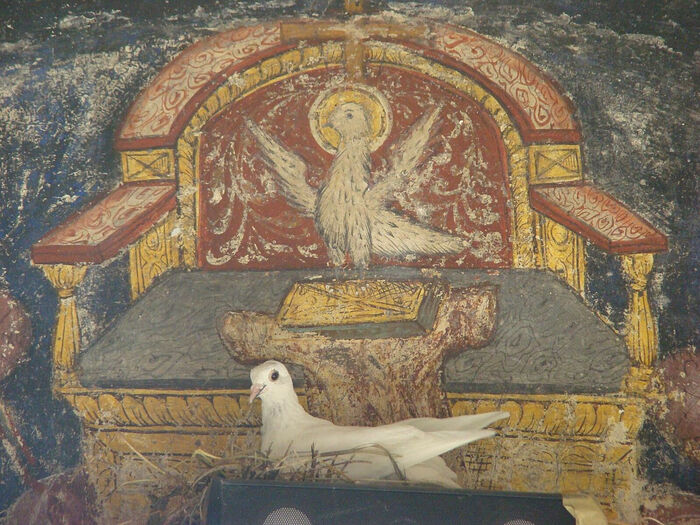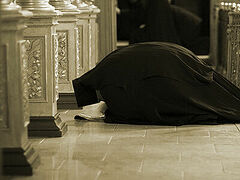Part 1/1: Let us Fast in Earnest
Part 1/2: The Meaning and Significance of Fasting
Part 1/3: Accustoming Ourselves to Fasting
Part 1/4: Spiritual Fasting
Part 2/1: On Prayer. What is Prayer?
Part 2/2: How to Prepare for Prayer?
Part 2/3: How to Pray?
Part 2/4: What to Do After Prayer?
Part 2/5: About the Jesus Prayer
Part 2/6: On Prayerful Ascent to God in the Heart
But know that by himself, left to his own devices, in the work of salvation without the grace of God, a Christian can’t even think anything good; but all his satisfaction is from God. He especially doesn’t know how and for what he should pray; and only the Holy Spirit instructs him about what he should pray for, and intercedes for him with unutterable groanings (Rom. 8:26). Knowing all this, a Christian turns to the Holy Spirit with the prayer “O Heavenly King” and the rest.
Having invoked the Holy Spirit into his heart and soul, purified from every defilement of flesh and spirit by His grace, and placed by Him on the path of salvation, the Christian thus establishes the ascent to God in his heart, raises his heart and mind to Him; and having renounced all things earthly and ascended, as it were, to the first heaven, sends up the thrice-holy hymn to God, once heard by a boy who was enraptured from Earth to Heaven: “Holy God, Holy Mighty, Holy Immortal” (3x).
Having sung the angelic Trisagion hymn, the Christian, aware of himself not as a heavenly holy angel, but an earthly sinner, boldly goes further, higher, closer to God with his mind and heart, and ascends as it were to the second heaven, tremulously, with reverence, crying out: “Glory to the Father and the Son and the Holy Spirit;” and deeply aware of his sinfulness, his iniquity and his infirmities, he prays with a strong cry and tears, or, at least, he should pray: “O Most Holy Trinity, have mercy on us,” and the rest.
Not stopping there, with the prayer: “Lord, have mercy” (3x), a Christian aspires higher, with praise in his heart and on his lips; with “Glory, both now,” he mentally ascends as if to the third heaven, before the face of the Lord God Himself, eternally abiding in glory unspeakable, incessantly hymned by the archangels, angels, and all the saints of God; he ascends to this immeasurable height with a golden key from the very heart of God, so to speak, with the Lord’s Prayer, given to us by our Lord Jesus Christ; and with a living, sincere faith in the merits of the Cross of the Redeemer of mankind, having crossed himself, with filial boldness, he prays to the Heavenly Father: “Our Father, Who art in Heaven…”
Thus enraptured to the third heaven, like the holy Apostle Paul, and realizing he was sprinkled with the blood of the Son of God, embraced by the favor of God the Father and quickened by the grace of the Holy Spirit, the Christian again cries out from the depths of his soul: “Lord, have mercy (12x). Glory to the Father and to the Son, and the Holy Spirit…” And knowing Who gave him such grace, he falls into the dust before his Savior, calling out to Him with all the strength and feelings of his spirit: “Come, let us worship” (3x).
Then, calmly, consciously, with deep feeling, he reads the prayers in order, beginning with Psalm 50 and the Creed, in fulfillment of the first Gospel commandment: Repent and believe in the Gospel (Mk. 1:14).
This is not only at the beginning of our prayers, but also in the middle, and more than once—nine times a day, and more than twenty times during Great Lent; and this is so that our attention, which sometimes weakens, might be constantly kept at a prayerful height.
Such is the meaning and significance of the entrance prayers and usual beginning! The first gathers our scattered thoughts and feelings and focuses them on the incarnate economy of our salvation, without which no prayer is conceivable; and the second establishes the ascent to God in our heart, which is absolutely necessary for proper and saving prayer.
O, my beloved, if only you would delve into the meaning of our prayers, understand their meaning and acquire the spirit of prayer! Then, inspired by fasting and prayer, we would irresistibly strive for God; then we wouldn’t have this unfortunate lethargy, dullness, laziness, or unwillingness to pray. On the contrary, then we would be burning in spirit and would strive for prayer with unquenchable thirst. In a word, then the words of the Psalmist would be realized in us: As the hart panteth after the fountains of water, so panteth my soul after Thee, O God. My soul hath thirsted for God, the mighty, the living; when shall I come, and appear before the face of God? (Ps. 41:1-2).






